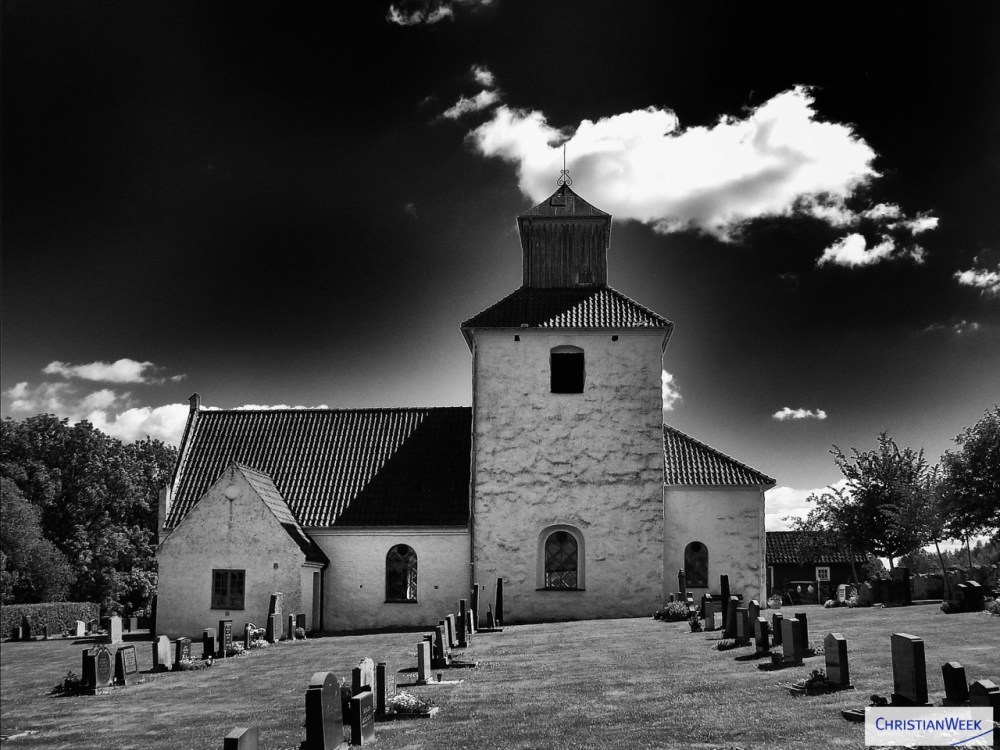
By Paul Walker
November 9, 2016
What happens after you die? The standard Sunday School answer is captured in the often repeated statement, “You go to heaven when you die.”But that leads to other questions like, what is heaven like?
There is no shortage of speculation about what heaven will be like. Some people imagine the popular vision of the pearly gates of heaven suspended high up in the clouds. Those who are welcomed past these gates are treated to bright lights, smooth Jazz, halos, and harps.
Others think of the hymnal lyrics of vacating this earth “To that home on God’s celestial shore. I’ll fly away.” And, still others struggle with any sort of concrete vision of life after death.
The abundance of caricatures has left them in a state of confusion about all post-mortem matters. Perhaps, this is why for many people the statement, “you go to heaven when you die”, is both the minimum and maximum explanation of what can be said about life after death.
How will we ever find clarity and understanding in the presence of such diverse speculations on the afterlife? Let me suggest that as a starting point we should resist the urge to say too little and too much about life after death. If we say too little, we risk missing out on the truth. If we say too much, we risk distorting the message of hope.
I think this is exactly why we need to recapture a fresh vision of what both the creeds and scriptures have to teach us on life after death, and life after life after death. Faithfulness to scripture and creed can help us navigate the rough waters of confusion and caricature.
So what do scripture and creed teach us about life after death?
For starters, both the scriptures and creeds teach the resurrection of the dead as the ultimate hope of the redeemed. This is the understanding that our bodies will be glorified and recreated in the same manner that Jesus’ own crucified body rose from the grave on Easter morning.
This is very different from the picture of a disembodied soul going to heaven when you die. The resurrection of the body is properly not about life after death, but life after life after death (N.T. Wright). It is the promise of New Creation.
Now you might be thinking. “Wait a minute! How does that fit in with going to heaven when you die?” Well, to answer that question we need to realize that while heaven may be a temporary place for the soul, heaven is not the ultimate destiny of the redeemed.
As the preeminent theologian N. T. Wright has noted, “Heaven is important, but it is not the end of the world.”
Let’s explore this further.
The nature of heaven
Heaven was created alongside earth in the beginning (Genesis 1:1) and will be re-created alongside the earth for union at the end of the age (Revelation 21-22).
Ancient Jewish thinking likens heaven to a physical place above the earth, and the abode of God. It’s perhaps best to view heaven as not so much a physical location, but a realm and a dimension that exists both alongside and separate from ours in a mysterious interlocking relationship that defies any easy explanation.
Heaven is a place where believers go in death. The Apostle Paul reminds us of this when he writes,“to be away from the body is to be at home with the Lord” (2 Corinthians 5:8), and when he speaks of his desire to “be with Christ” upon death (Philippians 1:23).
While heaven is the dwelling place for the soul, the weight of scripture points to an eventual future embodied resurrection of the dead and not a disembodied existence apart from the earth.
It is helpful to consider heaven as a temporary resting place for the souls of the saints. Heaven and earth will one day be joined as one in the culmination of the new creation. John, the writer of Revelation, describes such a union with his description of the new Jerusalem descending from heaven to inaugurate the new age (Revelation 21-22).
The Biblical hope of resurrection
A huge misunderstanding about the creedal statement of the resurrection of body is that it implies a disembodied soul escaping to a platonic heaven for eternity.
As N.T. Wright puts it,
“Resurrection isn’t a fancy way of saying, ‘going to heaven when you die’. It is not about the ‘life after death’ as such. Rather, it’s way of talking about being bodily alive again after a period of being bodily dead. Resurrection is a second-stage postmortem life: ‘life after life after death’.”
When the Apostle’s Creed speaks of the resurrection of the dead it is saying that our bodies will become like Christ’s resurrected body. It is a bold reminder that the new creation was inaugurated on Easter morning, as Jesus burst forth from the tomb, will no longer be the ‘not yet’ for those who wait upon the Lord.
As the Apostle Paul makes clear, “[Christ] will transform our lowly bodies so that they will be like his glorious body”(Philippians 3:21). The resurrection of the body is God creating for us physical, glorified, and immortal bodies that can participate in the new creation in which there is no longer any death or decay.
This is why the Apostle Paul writes, “When the perishable has been clothed with the imperishable, and the mortal with immortality, then the saying that is written will come true: “Death has been swallowed up in victory” (1 Corinthians 15:54). This will take place when Jesus comes again to judge the living and the dead at the end of this age (Isaiah 65-66; 1 Thessalonians 4:16-17; Revelation 20-22).
Why does the resurrection of the body matter?
1. The resurrection of the body teaches us that God has not given up on the mission of rescue and renewal.
The biblical hope found in the long narrative arc of scripture boldly proclaims that God has been in the process of putting the world to rights, bringing order to chaos, and establishing shalom to our violent disordered world.
The resurrection of the body is God’s supreme act of rescue from the curse of death. It is God creating for us physical, glorified, and immortal bodies that can participate in the New Creation in which there is no longer death and decay.
This is why the Apostle Paul writes, “When the perishable has been clothed with the imperishable, and the mortal with immortality, then the saying that is written will come true: “Death has been swallowed up in victory” (1 Corinthians 15:54).
2. The resurrection of the body reminds that this world matters.
Unlike the Gnostic inclination to devalue the material world around us, Christians confess that this is our Father’s world.
A belief in the resurrection of the body is also a belief in our restored relationship to rightly rule and reign with Christ over God’s good creation. This is why the Apostle Paul so closely connects the liberation of creation to the redemption of the children of God in Romans 8.
As N.T. Wright reminds us,
“When humans are put right, creation will be put right. That is the ultimate point, the glorious full sweep of Paul’s soteriology.”
God’s rescue project is more than just for individuals, but for all of creation. This has huge implications for how we treat our Father’s world today. We as Christians must begin to live now in this age, the ‘not yet’ promise of the age to come.
The resurrection of the body should remind us that our actions and attitudes towards creation should be compatible with the restoration of all things through God’s healing of this world.
3. The resurrection of the body is a blessed hope for those whose bodies are failing them.
Our current bodies are wasting away, corruptible, and susceptible to destruction. As a Pastor, I’ve sat with many people whose bodies were in various stages of giving out on them. It is no easy process to have your body fail you. I know full well that one day my own body will follow that path.
The Apostle Paul describes this process with his imagery of “an earthly tent” and our longing to be clothed with a “heavenly building”. (2 Cor 5) The comparison between a flimsy tent and an established building is quite striking. It’s the difference between camping out and establishing a life. It’s the difference between a tattered cloth and a building made from stone.
This will be the difference between our current bodies and our resurrected ones. Our experience of groaning in our earthly tent, according to the Apostle Paul, is the very cry of longing for a resurrected eternal body.
He writes,
“For while we are in this tent, we groan and are burdened, because we do not wish to be unclothed but to be clothed instead with our heavenly dwelling, so that what is mortal may be swallowed up by life” (2 Corinthians 5:4).
Our frustrations with our bodies would be irrational if our hope was an eternal disembodied post-mortem reality. In fact, one might see cause to celebrate the degradation of our bodies if this was the case.
Rather, our groaning and burdens in our present states, suggests the Apostle Paul, are evidence for our longing to be clothed in our heavenly dwelling. We do not wish to be unclothed but to be clothed!
The resurrection of the body reminds us that though we may grieve our current bodily failings, our future resurrected bodies will not fail us. Instead, let us look forward to the day where“there will be no more death’ or mourning or crying or pain, for the old order of things has passed away” (Revelation 21:4).
Thanks be to God! Maranatha!
_______________
Justin S. Holcomb, Know the Creeds and Councils, 2014 .
Michael F. Bird, What Christians Ought to Believe: An Introduction to Christian Doctrine through the Apostles’ Creed, 2016 .
N.T. Wright, Surprised by Hope: Rethinking Heaven, the Resurrection, and the Mission of the Church, 2008, pg. 52.
N.T. Wright, Simply Christian: Why Christianity Makes Sense, 2006, pg. 114-115, emphasis original.
N.T. Wright, Surprised by Scripture: Engaging Contemporary Issues, 2014, pg. 89.



